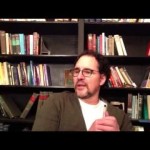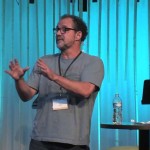We run our website the way we wished the whole internet worked: we provide high quality original content with no ads. We are funded solely by your direct support. Please consider supporting this project.

Will Violence against ISIS Root Out Evil?
Image by arbyreed via Flickr
Fallen humans tend to identify their own group as righteous and any group that opposes them as evil. If they were not evil, we tend to believe, no conflict would exist. Hence, the only way to end the conflict is to rid the world of this evil. This is the age-old “myth of redemptive violence.”
The true cause of violence, of course, is not “the enemy” but something much more fundamental, something both we and the enemy have in common. The true cause lies in the fact that our fallen hearts are idolatrous and subject to the fallen powers that influence us.
So long as people locate their worth, significance, and security in their power, possessions, traditions, reputations, religious behaviors, tribe, and nation rather than in a relationship with their Creator, a violent tit-for-tat game is inevitable. Of course, peaceful solutions must still be sought and can, to some degree, be attained with regard to each particular conflict. But as long as humans define their personal and tribal self-interests over and against other people’s competing personal and tribal interests, violence is inevitable and will break out again.
History is filled with people who believed that this or that war would root out evil once and for all and bring about lasting peace. The myth has been especially strong in American history. We, the righteous nation, will root out all evil. Any peace achieved by violence is a peace forever threatened by violence, thus ensuring that the bloody game will be perpetuated.
The hope of the world lies in a kingdom that is not of this world, a kingdom that doesn’t participate in perpetuation of the bloody game, a kingdom that operates with a completely different understanding of power. The unique nature of this kingdom is revealed in a discussion Jesus had with some of his disciples when they asked who would be the greatest in the kingdom. Jesus responded:
The kings of the Gentiles lord over them; and those in authority over them are called benefactors. But not so with you; rather the greatest among you must become like the youngest, and the leader like one who serves. For who is greater, the one who is at the table or the one who serves? Is it not the one at the table? But I am among you as one who serves. (Lk 23:25-27)
Jesus identified the disciples’ argument as a typical kingdom-of-the-world conflict—and thoroughly pagan. This is the way worldly rulers—and the world in general—naturally think. Indeed, it is a matter of common sense by the world’s standards. Naturally the older is greater than the younger, the leader worthy of higher esteem than the follower, the one who sits at the table greater than the one who serves. Yet Jesus not only rejects this “common sense” logic—he reverses it! Jesus, the Son of God, the one who is greatest by any standard, came to earth not to be served but to serve others, and the kingdom he came to establish would be marked by this distinctive feature.
—Adapted from The Myth of a Christian Nation, pages 26-28
Category: General
Tags: Evil, Myth of a Christian Nation, Non-Violence, Upside-Down Kingdom, Violence, War
Topics: Following Jesus
Related Reading

Finger-Pointing and the Impulse to Judge
To no one’s surprise, yet to the sadness of many of us, several Christian spokespeople, including James Dobson, Mike Huckabee and Bryan Fischer, are blaming the shootings in Newtown, Conn, on abortion and gay marriage. This is sadly reminiscent of Jerry Falwell’s hurtful response to 9/11 when he divined that “the pagans,” “abortionists,” “feminists,” “gays,” “lesbians,”…

The Unfaithfulness of Violence
For more videos like this be sure to visit The Work of the People.

Be the Change Now
Ghandi once said, “Be the change you want to see in the world.” It’s a profoundly Kingdom teaching. It seems to me, however, that few people adopt Ghandi’s philosophy. It’s far easier to focus our attention on how others should change. It’s far easier to spend our energy assigning blame for the problems of society…

The Rorschach Test
The choices we make will either increase or decrease our ability to recognize light when we see it. As we choose goodness, we increase our capacity for goodness. What do you see when you read the Bible or look at God or interact with others? Everything is a Rorschach test to some extent, revealing the light…

Greg Shares His Journey and Some Challenges Ahead
http://youtu.be/YdZKPG20kmQ Last September, Greg was asked to give the opening address at the Missio Alliance event Church & Post-Christian Culture: Christian Witness in the Way of Jesus. You can find more information here. Special thanks to our very own Stephen Konsor for his role in filming and editing this and other sessions. Enjoy!

Was Jesus Violent in the Temple?
Many adopt the attitude depicted in the picture above, saying that Jesus used violence when he cleansed the temple. But Jesus’ stance on nonviolence is clear not only from how he responded to threatening enemies at the end of his life; it’s also strongly emphasized his teachings. We need to understand what Jesus was up…
